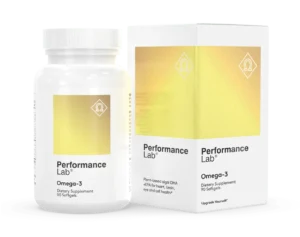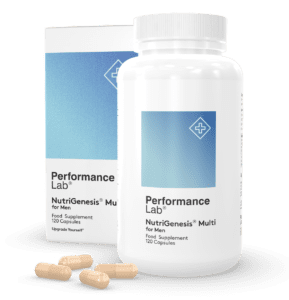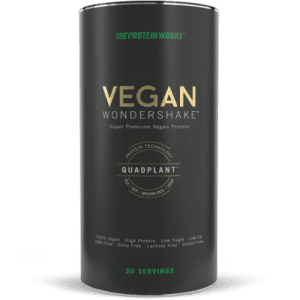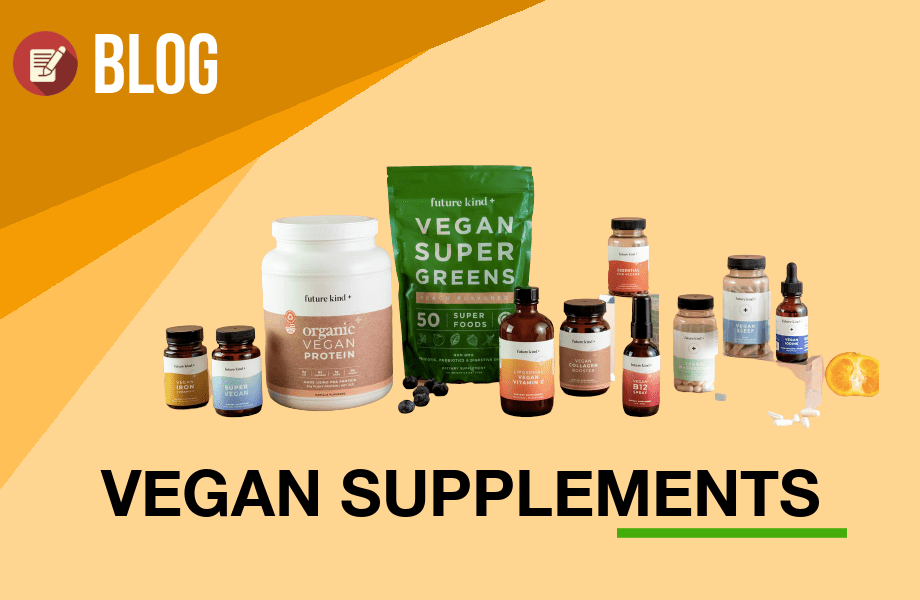Vegan Supplements, Your Greatest Ally or Waste of Money?
Plant-based diets are rapidly increasing in popularity. Due to the environmental and ethical concerns, as well as the potential health benefits, vegan diets are promoted within our society.
Althougth there are many benefits to a vegan diet, there are some downsides when it comes to nutritional input. While in theory it is possible to get all the nutrients from plant-based sources only, research has shown that vegetarians and vegans tend to lack certain nutrients.
These include iron, vitamin B12, and omega-3, most noticeably. But there are few other nutrients that you could be deficient on as a vegan.
Thus, in this article we are going to have a look at the most common deficiencies in a vegan diet, and see whether you should take vegan supplements.
We are also going to explain which vegan supplements are worth it, and which are just a scam.
The Vegan Diet: A Brief Overview
A vegan diet eliminates all animal products, focusing instead on plant-sourced foods such as fruits, vegetables, whole grains, legumes, nuts, and seeds.
While veganism offers numerous health benefits, including lower risks of heart disease, stroke, and diabetes, it’s not a guarantee of optimal health or immunity from nutrient deficiencies.
Just like omnivores, vegans need to ensure they’re getting a balanced intake of essential nutrients. This doesn’t necessarily involve tracking every morsel of food, but it does mean understanding and applying basic nutrition knowledge to ensure a balanced diet.
However, as shown by multiple studies vegan diets are poor in key nutrients like:
- Vitamin B12
- Omega-3
- Zinc
- Iron
- Vitamin K2
- Protein
Deficiencies and the Best Vegan Supplements
The Role of Omega-3 Fatty Acids in a Vegan Diet
Omega-3 fatty acids are essential fats that play a crucial role in heart health, blood pressure regulation, and reducing inflammation in the body. In the context of a vegan diet, omega-3 fatty acids require special attention.
One randomized clinical trial found that supplementation with algal omega-3s effectively increased the omega-3 index and improved the fatty acid profile in both vegetarian and vegan individuals. These findings suggest that algal omega-3 supplementation can be a valuable option for vegans and vegetarians to obtain sufficient omega-3 fatty acids and potentially reduce their cardiovascular risk.
The ALA Conversion Problem
While fish are a common source of omega-3 fatty acids, they’re not an option for vegans. However, the plant-based sources often recommended, such as flax seeds, chia seeds, and walnuts, mostly contain Alpha-Linolenic Acid (ALA), not Eicosapentaenoic Acid (EPA) or Docosahexaenoic Acid (DHA) that are crucial for human health.
The human body can convert ALA into EPA and DHA, but this conversion is inefficient, making it challenging for vegans to get enough EPA and DHA from their diet.
A study showed that ALA converts to EPA at just 6%, while it converts into DHA at only 3.8%. Furthermore, this conversion can be decreased by omega-6 polyunsaturated fatty acids up to 50%!
Considering that most plant-based oils are rich in omega-6, using ALA as omega-3 source is not ideal.
For this reason, vegans should consider taking an algae-based omega-3 supplement, which is rich in EPA and DHA.
Best Vegan Omega-3 Supplement

Performance Lab Algae Based Omega-3
Vitamin B12: A Critical Nutrient for Vegans
Vitamin B12 is perhaps the most well-known case of deficiency in vegans.
This vitamin, critical for neurological function, immune system maintenance, and DNA synthesis, is one of the most important vegan supplements. It’s produced by bacteria in soil and is not abundantly available from plant sources
To ensure sufficient intake of vitamin B12, vegans can rely on fortified foods and supplements. Many plant-based food manufacturers fortify their products with vitamin B12, including breakfast cereals, nutritional yeast, and tofu.
The daily recommended intake of Vitamin B12 is around 2.4 micrograms. A B12 supplement ensures that you’re getting an accurate amount daily, maintaining healthy B12 stores for the foreseeable future.
Best Vitamin B12 Supplement
Most vitamin B12 tablets or capsules will work. As long as it is from a trusted source, or from a multivitamin with extra vitamin B12 it will work.
Meeting Iron Needs on a Vegan Diet
Iron is an essential mineral that plays a crucial role in transporting oxygen throughout the body and supporting various bodily functions.
While iron is present in both animal and plant-based foods, it is generally harder for the body to absorb iron from plant-based sources, known as nonheme iron, which can put vegans at a higher risk of iron deficiency anemia.
To ensure sufficient iron intake, vegans can incorporate iron-rich plant-based foods into their diet, such as beans, tofu, fortified cereals, pumpkin seeds, dried fruit, spinach, broccoli, quinoa, nuts, and whole-grain pasta.
Best Iron Supplement for Vegans
Dried beans (e.g. lentils, chickpeas) and dark leaf greens (like spinach) are good sources of plant-based iron.
It is also recommended to pair it with vitamin C which increases absorption.
That said, a multivitamin could do the trick as well.

Ensuring Adequate Calcium Intake on a Vegan Diet
Calcium is a mineral essential for bone health, blood flow, hormone release, and maintaining strong muscles and teeth. While dairy products are a common source of calcium for many individuals, vegans need to find alternative ways to meet their calcium needs. Fortunately, various plant-based sources of calcium can be included in a vegan diet.
Some examples of calcium-rich foods for vegans include chia seeds, soy milk, tofu, almonds, kale, broccoli, and arugula.
Calcium supplements may also be considered if dietary intake alone is insufficient.
Best Calcium Supplement
Just take a multivitamin.
The Importance of Vitamin D
Vitamin D is a unique nutrient that the body can produce with the help of sunlight.
However, vitamin D deficiencies are prevalent, with a significant percentage of the population not getting enough. While some foods, such as fish and eggs, contain vitamin D, they are unsuitable for vegan diets.
As a result, vegans may struggle to meet the recommended intake of vitamin D unless they consume it through fortified foods or supplements.
Best Vegan Vitamin D Supplement
We recommend taking a multivitamin.
A Closer Look at Zinc in a Vegan Diet
Zinc is an essential nutrient that plays a vital role in growth, hormone production, immune response, wound healing, and blood clotting.
While zinc is plentiful in meat and can also be found in protein-rich plant-based foods including beans and nuts, some vegans don’t get enough.
A good rule of thumb is to eat at least three servings of legumes, including beans, lentils, peanuts, and soy foods every day, along with some nuts and seeds.
Understanding the Role of Iodine in a Vegan Diet
Sea life is a source of iodine which vegans do not consume. So unless you’re eating sea vegetables several times a week or using iodized salt, you’re likely not getting enough of this nutrient that is important for thyroid health.
Best Zinc Supplement for Vegan
As above, just take a comprehensive multivitamin
The Essential Role of Selenium in a Vegan Diet
Selenium is a mineral that supports various bodily functions, including thyroid function, immune response, and the health of hair and nails.
Research has shown that vegetarians and vegans may have lower selenium intakes than individuals following omnivorous diets.
Vitamin K: More Than Just a Blood Clotting Agent
Vitamin K is essential for blood clotting and protecting against excessive bleeding.
Leafy greens like kale, spinach, collard greens, broccoli, and Brussels sprouts are excellent vegan sources of vitamin K1. Fermented foods such as vegan sauerkraut, kimchi, and dairy-free kefir can also provide some vitamin K2.
Amino Acids and Complete Protein Sources
Protein is an essential nutrient that is often lacking in our diets.
That said, it’s particularly true for vegans, as most plant-based protein sources are “incomplete”.
Compared with animal-based protein, the proteins derived from plants are easier to produce; however, when utilized as dietary sources for human consumption, most of the plant proteins are deficient in essential amino acids and are, therefore, nutritionally incomplete
Langyan et al., Frontiers in Nutrition 2021
Soy protein is one of the few complete vegan protein sources. It’s also great due to its high absorption rate, and easiness of consumption. That said, as with many other plant-based proteins the taste can be an issue.
Best Plant-Based Protein

Wondershake by Protein Works.
- 89kcal
- 21g of premium plant-based protein
- Excellent taste
The Best Supplements for Vegans
So what are the must-take supplements for vegans?
As showcased above, you can live a fully plant-based diet sourcing your nutrients solely from food, but you will be a lot more likely to lack in at least one of these nutrients.
The downsides might not be noticeable straight away, but could harm you in the long run.
In particular, these are the most important supplements to take within a vegan diet, as shown by science:
- Vitamin B12. Take multivitamins.
- Omega-3 fatty acids rich in EPA and DHA. Performance Lab’s Omega-3 is our top choice.
- Iron. Take multivitamins.
- Protein. Make sure is a complete protein.
Another trick to make sure you consume enough micronutrients is to add plant-based meal replacement shakes.
Shakes like Lyfefuel Daily Essentials are designed to provide you with all essential nutrients including protein, carbs, fiber, healthy fats, and micronutrients. All in an easy-to-drink meal.
Creatine, Boost Your Performance
One surprising supplement that vegetarians and vegans might benefit more than omnivores is creatine.
While creatine has extensively been researched and proved to enhance performance inomnivores, this effect could be increased in vegans.
Studies have shown that due to the lack of creatine within vegan diets, supplementation can lead to a major response.
The Worst Vegan Supplements – Must Avoid
However, not all vegan supplements are worth your money.
As discussed above, you don’t need special vitamin B12 or iron or selenium supplements. A comprehensive multivitamin for vegan will work just fine.
Similarly, many people tend to like flaxseed oil as their source of omega-3. This is, however, a mistake, as flaxseed is rich in ALA which does not convert well into EPA and DHA. Even further, it competes with EPA and DHA, which could lower the efficiency of any other omega-3 supplement that you are taking.
Conclusion: Vegan Supplements; What’s Good and What’s Not
With proper planning and attention to nutrient intake, vegans can enjoy the many benefits of a plant-based lifestyle while supporting their overall health and well-being.
By incorporating a variety of nutrient-rich plant foods into their diet, such as fortified foods, legumes, nuts, seeds, leafy greens, and whole grains, vegans can meet their nutritional needs and thrive on a plant-based lifestyle.
The best vegan supplements include:
- Algae based omega-3
- Protein powder (soy or a blend of different plant-based protein)
- Multivitamin
- Creatine
Whereas the vegan supplements to avoid are:
- Flaxseed oil
- Special iron, selenium or vitamin B12 tablets (just take a multivitamin

